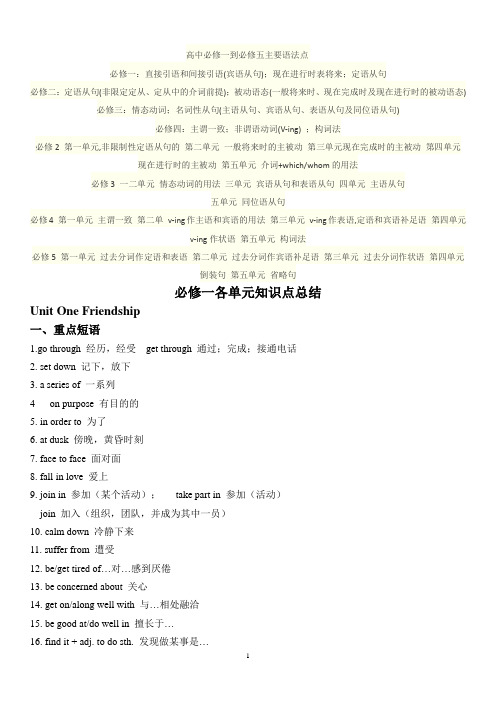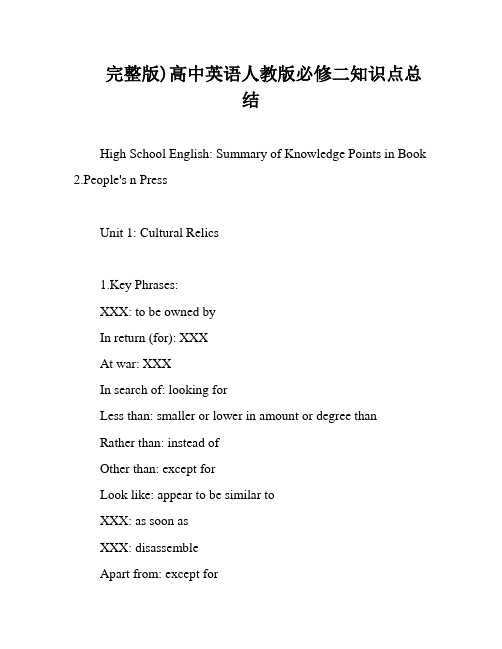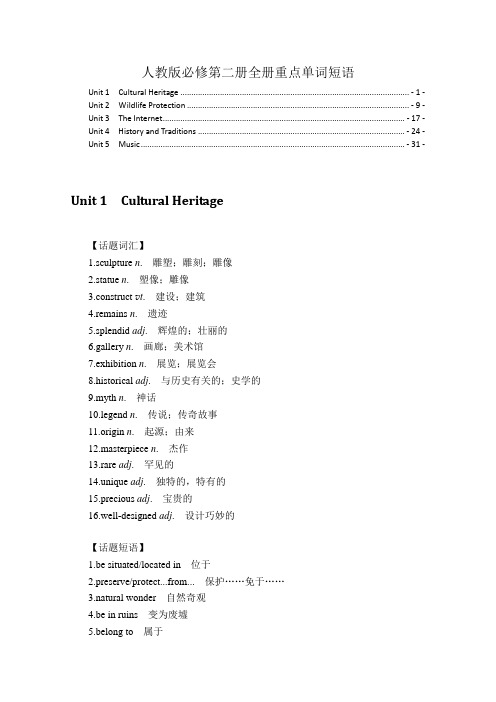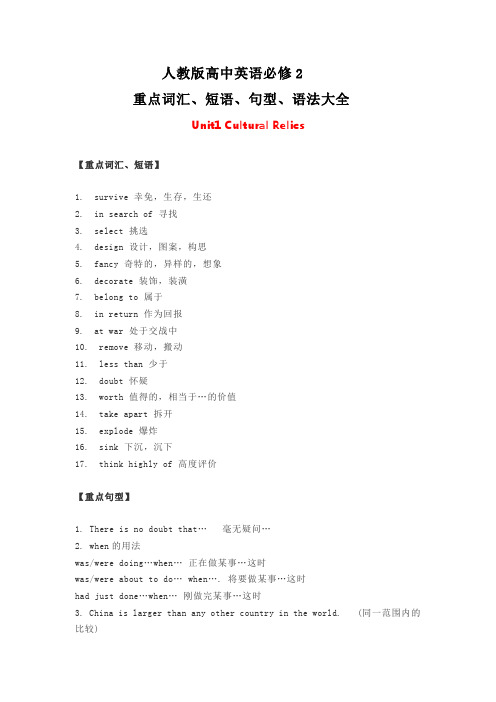高中英语新人教版必修二全册语法汇总(分单元编排)
人教版高中英语必修二重点词汇、短语、句型、语法大全

人教版高中英语必修二重点词汇、短语、句型、语法大全Unit 1 Cultural RelicsKey Vocabulary and Phrases1.Survive: to remain alive。
to endure。
XXX2.In search of: looking for。
seeking3.Select: to choose。
to pick out4.Design: plan。
pattern。
concept5.Fancy: unusual。
peculiar。
imaginative6.Decorate: to adorn。
XXX7.XXX: to be a part of。
to be owned by8.In return: as a result。
in exchange9.At war: XXX10.Remove: to take away。
to relocate11.Less than: not as much as12.Doubt: uncertainty。
skepticism13.XXX: deserving of。
XXX14.Take apart: to dismantle。
to disassemble15.Explode: to burst。
XXX up16.Sink: to descend。
to XXX17.Think highly of: to have a high n ofKey Sentence Structures1.There is no doubt that…: It is XXX…2.When…: XXX.parisons: Used to compare one thing to another。
Can be within the same scope or XXX.4.The way…: Used to describe the manner in which something is done or explained.5.Worth: Used to describe the value or importance of something.6.“n word + to do” structure: Used as the subject。
(完整版)人教版高中英语必修语法知识点总结

高中必修一到必修五主要语法点必修一:直接引语和间接引语(宾语从句);现在进行时表将来;定语从句必修二:定语从句(非限定定从、定从中的介词前提);被动语态(一般将来时、现在完成时及现在进行时的被动语态) 必修三:情态动词;名词性从句(主语从句、宾语从句、表语从句及同位语从句)必修四:主谓一致;非谓语动词(V-ing) ;构词法必修2 第一单元,非限制性定语从句的第二单元一般将来时的主被动第三单元现在完成时的主被动第四单元现在进行时的主被动第五单元介词+which/whom的用法必修3 一二单元情态动词的用法三单元宾语从句和表语从句四单元主语从句五单元同位语从句必修4 第一单元主谓一致第二单v-ing作主语和宾语的用法第三单元v-ing作表语,定语和宾语补足语第四单元v-ing作状语第五单元构词法必修5 第一单元过去分词作定语和表语第二单元过去分词作宾语补足语第三单元过去分词作状语第四单元倒装句第五单元省略句必修一各单元知识点总结Unit One Friendship一、重点短语1.go through 经历,经受get through 通过;完成;接通电话2. set down 记下,放下3. a series of 一系列4 on purpose 有目的的5. in order to 为了6. at dusk 傍晚,黄昏时刻7. face to face 面对面8. fall in love 爱上9. join in 参加(某个活动);take part in 参加(活动)join 加入(组织,团队,并成为其中一员)10. calm down 冷静下来11. suffer from 遭受12. be/get tired of…对…感到厌倦13. be concerned about 关心14. get on/along well with 与…相处融洽15. be good at/do well in 擅长于…16. find it + adj. to do sth. 发现做某事是…17. no longer / not …any longer 不再…18. too much 太多(后接不可数n.)much too 太…(后接adj.)19. not…until 直到…才20. it’s no pleasure doing sth 做…并不开心21. make sb. sth. 使某人成为…make sb. do sth. 使某人做某事二、语法----直接引语和间接引语概念:直接引语:直接引述别人的原话。
人教版版高中英语必修二重点语法汇总

人教版版高中英语必修二重点语法汇总Unit 1: 限制性定语从句和非限制性定语从句定语从句可分为限制性定语从句和非限制性定语从句。
限制性定语从句是指如果一个句子去掉定语从句后,主句的意思不是所要表明的意思,那么这个定语从句就是限制性定语从句。
非限制性定语从句则不用限制先行词。
最大的特点就是先行词后面有逗号隔开。
例如:XXX should be punished.XXX who breaks the rules should be punished.在第二个句子中,如果去掉定语从句,“Anyone should be punished”这个句子的意思就不完整了,因此这是一个限制性定语从句。
例如:She is good at speaking French。
XXX.This book was written by Jack。
who was here a moment ago.I have some friends。
XXX.这些句子中的定语从句都是非限制性定语从句。
限制性定语从句的连接词可以用who、whom或whose、which,但不能用that,也不能省略。
例如:She had eight children。
three of XXX.XXX is a Japanese。
whose wife is a Chinese.My sister。
who is a nurse。
got married last month.China has hundreds of islands。
the largest of which is XXX.非限制性定语从句还可以用when或where引导。
例如:She is going to Shanghai。
where she was born.We will go home next week。
when we won’t be so busy.除了前面提到的那些连接词以外,在以下两种情况下还可以用as作为定语从句的连接词:1.当先行词在从句中做主语或者宾语的时候,同时先行词又被same、so或者such修饰的时候。
(新)高中英语人教版必修二知识点总结

高中英语人教版必修二知识点总结Unit 1 Cultural Relics1.重点短语belong to 属于in return (for)作为回报at war 处于交战状态in search of 寻找less than 少于rather than 而不是other than 除了look like 看起来像hardly…when…= no sooner…than 一….就… take apart 拆开apart from除了think highly of 对…评价很高on trial 在审判中by design= on purpose 故意to one’s amazement 令某人吃惊的是…be amazed at… 对…感到吃惊care about 关心;在乎agree with 同意remove one’s doubt 消除某人的疑虑decorate..with…用…装饰by chance= by accident 偶然at midnight 在午夜fancy doing…. 想做某事… fancy sb to be / as… 认为…是…2.句型1)There is no doubt that… 毫无疑问… There is doubt whether…有疑问2)when的用法be doing…. when… 正在做某事…这时b e about to do… when…. 将要做某事…这时h ad just done…when… 刚做完某事…这时3) China is larger than any other country in the world. (同一范围)She runs faster than any man in Greece. (不同范围)4)the way的用法The way___ he explained to us was quite simple. (that/which/省略) The way ___ he explained the sentence to us was not difficult. (that/in which/省略)5) worth的用法be (well) worth doing sth (很)值得做某事be worthy to be done = be worthy of being doneIt’s worthwhile to do sth= it’s worthwhile doing sth6) “疑问词+ to do” 结构,在句中做主语.宾语.表语;How to do it is a question. I don’t know what to do next.7) it做形式主语句型:it is said that…./ it is reported that…/ it can be proved that… / it is evident that… /it is well known that..= what is well known is that… it occurs to sb that…(某人突然想起….)8) 主谓一致(rather than/ as well as/ with/ together with/ along with)He rather than they is going to help us. They rather than he are going to help us.9)what 引导主语从句;在从句中作主语What he has said is of great importance.What happened to him remained unknown.Unit 2 The Olympic Games1.重点短语stand for 代表;象征stand out 显眼,突出every four years = every fourth year 每四年take part in 参加play a part/role in…在…中起作用as a matter of fact = in fact 事实上admit doing/ having done/ that-clause 承认做了某事be admitted to/into 被允许进入/录取compete with/against sb for sth 为某物和某人竞争volunteer to do sth 自愿做某事take place 发生take the place of = replace 代替in place of = instead of 代替in charge of 负责.. in the charge of .. 由…负责charge sb with sth = accuse sb of sth 因.. 指控某人free of charge 免费be allowed to do 被允许做make a bargain with sb. 和某人达成协议bargain with sb over/ about/ for sth 就某事与某人讨价还价one after another 一个接一个fall down 跌倒hear of 听说change one’s mind改变主意pick up 捡起/ 用车接/ 学会2. 重点知识点1)deserve的用法(用法相似的动词:need/want/require doing= need/want/require to be done 需要….)deserve to do sth 应该做/值得做deserve doing = deserve to be done 值得…(doing 表被动意义) Your suggestion deserves to be considered = deserves considering.2) take part in : 参加有组织的,重大的活动join in 参加正在进行的活动join: 参加团体,党派和组织(join the army; join the party)attend: 出席,参加,后跟meeting,wedding,class, course等3) nor/ neither + 助动词/ be /情态动词+ 主语:表示“…也不这样”I have never been abroad, and neither/ nor has he.If you don’t go to the party, nor will I.He is a diligent student, and she doesn’t like music. So it is with me./ It is the same with me.4) as …as…的用法He is as tall as his brother.as + adj. + a/an + n + as… / as + many/much + n. + as…像…那样;正如He is as good a teacher as my brother.Unit 3 Computers1.重点短语have something/nothing in common 有/ 无共同之处compare ..with….比较according to 根据from…on.. 从….起go by 经过as well as 和as well 也as a result 结果是as a result of 由于…result in 导致result from 起因于the way to do/ of doing sth 做某事的方法in a way 在某种程度上in the way 挡道in no way 绝不with the help of sb = with sb’s help 在某人的帮助下deal with 处理achieve/ reach the goal 实现目标apply for 申请apply to 应用于watch over 看守;监视be crazy about 对..着迷 a solution to…解决办法after all 毕竟consist of 由….组成come true 实现make good use of 好好利用give away 泄露,捐赠can’t help doing sth 情不自禁做某事as time goes by = with time going by 随着时间的流逝2.重点知识点1)主语+ be + adj + to do The question is easy to answer.2)rise/arise/arouse/raise的区别3). 状语从句的省略在when, while, if, unless, though, once等引导的状语从句中从句的主语和主句的主语一致, 且从句中的谓语含有be动词时, 为了使句子简洁, 可省略从句中的主语和be动词。
完整版)高中英语人教版必修二知识点总结

完整版)高中英语人教版必修二知识点总结High School English: Summary of Knowledge Points in Book 2.People's n PressUnit 1: Cultural Relics1.Key Phrases:XXX: to be owned byIn return (for): XXXAt war: XXXIn search of: looking forLess than: smaller or lower in amount or degree thanRather than: instead ofOther than: except forLook like: appear to be similar toXXX: as soon asXXX: disassembleApart from: except forThink highly of: to have a high n ofOn trial: being judged in a court of lawBy design= on purpose: XXXTo one's amazement: surprisinglyBe amazed at。
: to be surprised byXXX: XXXAgree with: to have the same XXXRemove one's doubt: XXXXXX。
: to adorn withXXX: accidentallyXXX: XXXFancy doing。
: to want to do somethingXXX。
2.Sentence Structures:1) There is no doubt that。
: It is XXX。
There XXX。
: It is uncertain whether。
新教材人教版高中英语必修第二册全册各单元重点单词短语句式语法详解

人教版必修第二册全册重点内容详解Unit 1Cultural Heritage ........................................................................................................ - 1 - Section ⅠListening and Speaking,Reading and Thinking ........................................ - 1 - Section ⅡDiscovering Useful Structures .................................................................. - 13 - Section ⅢListening and Talking,Reading for Writing ............................................. - 17 - Unit 2Wildlife Protection ................................................................................................... - 23 - Section ⅠListening and Speaking,Reading and Thinking ...................................... - 23 - Section ⅡDiscovering Useful Structures .................................................................. - 37 - Section ⅢListening and Talking,Reading for Writing ............................................. - 39 - Unit 3The Internet .............................................................................................................. - 45 - Section ⅠListening and Speaking,Reading and Thinking ...................................... - 45 - Section ⅡDiscovering Useful Structures .................................................................. - 57 - Section ⅢListening and Talking,Reading for Writing ............................................. - 59 - Unit 4History And Traditions .............................................................................................. - 68 - Section ⅠListening and Speaking,Reading and Thinking ...................................... - 68 - Section ⅡDiscovering Useful Structures .................................................................. - 81 - Section ⅢListening and Talking,Reading for Writing ............................................. - 84 - Unit 5Music ........................................................................................................................ - 93 - Section ⅠListening and Speaking,Reading and Thinking ...................................... - 93 - Section ⅡDiscovering Useful Structures ................................................................ - 100 - Section ⅢListening and Talking,Reading for Writing ........................................... - 104 -Unit 1Cultural HeritageSection ⅠListening and Speaking,Reading and Thinking重点单词1 former adj.以前的;两者中前者的[典型例句]The former Soviet Union consisted of fifteen union republics.前苏联由15个共和国组成。
新教材人教版高中英语必修第二册全册书重点单词短语句型汇总(2022新高考一轮复习资料)

人教版必修第二册全册重点单词短语Unit 1Cultural Heritage ........................................................................................................ - 1 - Unit 2Wildlife Protection ..................................................................................................... - 9 - Unit 3The Internet .............................................................................................................. - 17 - Unit 4History and Traditions .............................................................................................. - 24 - Unit 5Music ........................................................................................................................ - 31 -Unit 1Cultural Heritage【话题词汇】1.sculpture n. 雕塑;雕刻;雕像2.statue n. 塑像;雕像3.construct v t. 建设;建筑4.remains n. 遗迹5.splendid adj. 辉煌的;壮丽的6.gallery n. 画廊;美术馆7.exhibition n. 展览;展览会8.historical adj. 与历史有关的;史学的9.myth n. 神话10.legend n. 传说;传奇故事11.origin n. 起源;由来12.masterpiece n. 杰作13.rare adj. 罕见的14.unique adj. 独特的,特有的15.precious adj. 宝贵的16.well-designed adj. 设计巧妙的【话题短语】1.be situated/located in 位于2.preserve/protect...from... 保护……免于……3.natural wonder 自然奇观4.be in ruins 变为废墟5.belong to 属于6.non-material cultural heritage 非物质文化遗产7.traditional crafts 传统工艺品8.be listed in 被列入9.folk arts 民间艺术10.The cradle of the civilization 文明的摇篮【话题佳句】1.History and culture are the soul of the city and people should cherish the city's historic and cultural heritage as their own lives.历史和文化是一个城市的灵魂,人们要像爱惜自己的生命一样珍惜城市历史文化遗产。
人教版高中英语必修2重点词汇、短语、句型、语法大全

人教版高中英语必修2重点词汇、短语、句型、语法大全Unit1 Cultural Relics【重点词汇、短语】1. survive 幸免,生存,生还2. in search of 寻找3. select 挑选4. design 设计,图案,构思5. fancy 奇特的,异样的,想象6. decorate 装饰,装潢7. belong to 属于8. in return 作为回报9. at war 处于交战中10. remove 移动,搬动11. less than 少于12. doubt 怀疑13. worth 值得的,相当于…的价值14. take apart 拆开15. explode 爆炸16. sink 下沉,沉下17. think highly of 高度评价【重点句型】1. There is no doubt that…毫无疑问…2. when的用法was/were doing…when…正在做某事…这时was/were about to do… when…. 将要做某事…这时had just done…when…刚做完某事…这时3. China is larger than any other country in the world. (同一范围内的比较)She runs faster than any man in Greece. (不同范围内的比较)4. the way的用法The way___ he explained to us was quite simple. (that/which/省略)The way ___ he explained the sentence to us was not difficult. (that/in which/省略)5. worth的用法be (well) worth doing sth (很)值得做某事be worthy to be done = be worthy of being doneIt’s worthwhile to do sth = it’s worthwhile doing sth6. “疑问词+ to do”结构,在句中做主语、宾语、表语How to do it is a question.I don’t know what to do next.7. it做形式主语It has been proved that pride goes before a fall.事实证明骄必败。
- 1、下载文档前请自行甄别文档内容的完整性,平台不提供额外的编辑、内容补充、找答案等附加服务。
- 2、"仅部分预览"的文档,不可在线预览部分如存在完整性等问题,可反馈申请退款(可完整预览的文档不适用该条件!)。
- 3、如文档侵犯您的权益,请联系客服反馈,我们会尽快为您处理(人工客服工作时间:9:00-18:30)。
高中英语必修二语法汇总Unit 1 限制性定语从句限制性定语从句用来限制先行词的意义,在讲话时不需停顿,书写时不用逗号,通常由关系代词that,which,who,whom,whose,as和关系副词when,where,why引导。
一、基本概念1.先行词:被定语从句所修饰的词(有时是短语或句子)叫做先行词。
如下列句中加黑部分就是先行词。
She hasfound the necklace that she lost twoweeks ago.她找到了她两周前丢失的项链。
As a generalrule,the most successful manin life is the man who has the bestinformation.一般说来,生活中最成功的人是获得最佳信息的人。
Do youremember the day when we arrivedhere?你记不记得我们到这儿的那一天?2.关系词:用来引导定语从句的连接词叫关系词。
它包括关系代词(that,which,who,whom,whose,as)和关系副词(when,where,why)。
关系词在从句中都担任一定句子成分。
关系代词在从句中作主语、宾语、表语、定语;关系副词在从句中作状语。
We’re going to do somethingthat has never been done before.(作主语)我们打算尝试一下以前从来没有做过的事情。
He is a man whom we should all learn from.(作宾语)我们都应该向他学习。
He lives ina house whose window faces south.(作定语)他住在一个窗户朝南的房间里。
He is nolonger the person that he used tobe.(作表语)他不再是过去的样子了。
At the time when I saw him,he was well.(作时间状语)我见他的时候,他身体很棒。
They stilllive in the same house where theylived ten years ago.(作地点状语)他们仍然居住在十年前的那所房子里。
That is thereason why they suffered such greatloss.(作原因状语)这就是他们遭受那么大损失的原因。
[温馨提示](1)作宾语的关系代词常可省去。
如:There are some films(that) I’d like to see.(2)因为关系词在从句中已经担任了某一成分,所以关系词所代指的先行词在从句中不要再出现。
下面的句子都有错误:Mrs Smith whom you met her yesterday is a friend of mine.(去掉her)Guilin is a city which it has a history of 2,000 years.(去掉it)This is the place where my mother was born there.(去掉there)There are moments when I forgot all about it then.(去掉then)1.that用作关系代词,既可指人也可指物,可作主语、宾语或表语。
Is he theman that sells eggs?他是卖鸡蛋的那个人吗?(作主语,指人)Water that is impure often causes seriousillness.不洁净的水常会引起严重的疾病。
(作主语,指物)2.which用作关系代词时一般指物,可作主语、宾语。
She was noton the train which arrived just now.她不在刚才到达的那列火车上。
(作主语)This is thebook which you wanted.这就是你想要的那本书。
(作宾语)3.who只指人,在从句中可作主语、宾语。
A doctor isa person who looks after people’s health.医生是关照人们健康的人。
(作主语)The man who I saw is called Smith.我见到的那个人名叫史密斯。
(作宾语)4.whom用作关系词,只指人,在从句中一般作宾语。
Thegentleman whom she encounteredaddressed her with courtesy.她遇到的那位先生很有礼貌地和她讲话。
(作宾语)5.whose在从句中作定语,既可指人也可指物。
You’re the only one whose advice he might listen to.只有你的话他可能会听。
(指人)I’d like a room whose window looks out over the sea.我想要一个窗户面临大海的房间。
(指物)6.when的先行词须是表时间的词,在从句中作时间状语。
July andAugust are the months when theweather is hot.七八月是天气很热的月份。
7.where的先行词须是表地点的名词,在从句中作地点状语。
She’s going home where she can rest.她要回家休息了。
[温馨提示]关系副词where的先行词也可以是有地点含义的抽象名词(如point,case,situation,condition等)。
He has reached the point wherea change is needed.他已到了需要改变的地步。
(point 在此是抽象名词)8.why的先行词只有reason,在从句中作原因状语。
Do you knowthe reason why I left early?你知道我为什么早走吗?三、that和which引导定语从句的区别1.which可引导非限制性定语从句,that不可以。
He hadfailed the maths exam,which made his father veryangry.他数学考试不及格,这让他父亲很生气。
2.which之前可有介词,that之前不能有介词。
This is thehouse in which Lu Xun used to live.这是鲁迅过去住过的房子。
3.当先行词是all,everything,nothing,something,anything,much,little,few等不定代词时,常用that。
That is all that I want to say.那就是我想说的一切。
There is nothing that can prevent him from doingit.没有什么能阻止他这样做。
4.先行词是序数词或被序数词修饰时,多用that。
The first place that they visited in Guilin was Elephant Trunk Hill.他们在桂林参观的第一个地方是象鼻山。
5.先行词是最高级或被最高级修饰时,多用that。
This is the best film that I have ever seen.这是我看过的最好的电影。
6.先行词被the very,the only,just等修饰时,多用that。
This is the very dictionary that I want to buy.这正是我想买的字典。
Mr Smith is the only foreigner that he knows.史密斯先生是他唯一认识的外国人。
7.先行词既包括人又包括物时,用that。
The passengers and the suitcases that were still waiting hadto be transferred to another plane.仍在等待的乘客和行李只得改乘另一架飞机。
[温馨提示](1)way作先行词,若从句中缺少状语,则用that或in which引导定语从句,也可省略关系词。
I don’tlike the way (that/in which) hespeaks to his parents.我不喜欢他跟他父母讲话的方式。
(2)关系副词可由“介词+关系代词”代替。
I will remember the day when/onwhich I worked there.我将永远记住我在那儿工作的那一天。
My favorite city is Beijing where/inwhich I can visit the Great Wall.我最喜欢的城市是北京,在那里我可以参观长城。
(3)表“时间”,“地点”和“原因”的先行词如果在从句中作主语或宾语时,要用关系代词引导定语从句;如果在从句中作状语,则选用关系副词。
This is the museum that/whichI visited last year.这就是我去年参观的那座博物馆。
This is the museum wherehis father worked twenty years ago.这就是他父亲20年前工作过的那个博物馆。
The reason that/which hegave is unbelievable.他给出的理由让人无法相信。
The reason why heconducted so well was that he had made full preparations.他发挥的这么好的原因是他做了充分的准备。
Unit2 现在进行时的被动语态2.现在进行时的被动语态表示的意义(1)表示某事/某人此时此刻正在被……。
The criminalis being watched over by apoliceman.那名罪犯正由一名警察看守。
The bridge is being repaired.这座桥正在被修复。
(2)表示某事/某人现阶段正在被……。
Manyinteresting experiments are beingcarried out these days.这些天许多有趣的实验正在进行着。
(说话时并不一定正在进行)(3)表示一种经常性的被动行为,常与always,constantly,frequently等词连用,表示赞赏(扬)、羡慕、讨厌等感情色彩。
I feel verysurprised that the window of our classroom isfrequently being broken.我感到非常吃惊的是我们教室的那扇窗户经常被打破。
